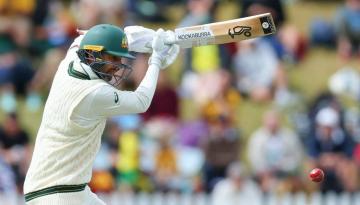Meet Indian cricket’s 17th Man – son of an influential father and misfits in dressing room
There is an intriguing line in the recent end-of-Ranji-season Instagram outburst by out-of-favour India batsman Hanuma Vihari. It is where he alleges political interference in cricketing affairs and vows to never turn up for Andhra again. Here’s how it goes: “I was the captain in the first game against Bengal. During that game, I shouted on (sic) 17th player and he complained to his dad (who is a politician). His dad in return asked the association to take action against me.”
The story goes that Vihari had to quit captaincy as the father of the 17th player, a YSR Congress corporator, allegedly had his way. The said episode, besides starting a cricketing inquest and political squabble in Andhra, also turns the limelight towards the dark corner of the dressing room that houses the non-playing, non-drinks-carrying extras – the mysterious 17th players on the Indian domestic circuit.

Ranji Trophy 2023/24 pic.twitter.com/PXHNG487BQ
— Hanuma vihari (@Hanumavihari) February 26, 2024
In a sport that needs 11 players on the field, and about 15 in a squad, the drafting of the additional extras is not always a contingency measure thought by an over-cautious administrator. In most cases, giving the team unwanted, unasked extra hands is a devious act of a compromised administrator.
The profiling of the Ranji Trophy’s 17th player gives an idea about the rot in the selection process and also explains the complexities of running cricket’s state units. In most cases, these ‘special extras’ are sons of influential and indulgent fathers. They are a shade apologetic when in the company of those who have rightly earned their first-class caps since deep down they know they don’t deserve to be there. Seen with suspicion, they are the uninvolved outsiders of the team.
Arguably the most discussed 17th player in Indian cricket happens to be Tejashwi Yadav, Laloo’s son and present-day Bihar chief ministerial-aspirant. The one-time cricketer has a record of sort of spending quality time in dugouts of both Team India and IPL. This was the time his father was the Railway Minister and also a BCCI member.
As a junior, Tejashwi was part of a special group of five junior cricketers who tagged along with the main India team for the 2008 u-19 World Cup in Malaysia. The official explanation being that the five were on an international exposure trip. It was the first time the Indian board had taken such an initiative and was subsequently discontinued. Later, he warmed the bench of IPL side Delhi Daredevils for close to five years without playing a single game. It was the time Delhi would trade the likes of Gautam Gambhir, Daniel Vettori, Tillakaratne Dilshan and AB de Villiers but their faith in their 17th player remained unshaken.
Pakistan has a name for such encroachers on the cricket turf. They are called Parchis – literally meaning chits of paper. The reference is to the recommendation slip, with the name of an undeserving cricketer, that the selectors carry to the meeting and push for their inclusion. India too shares this tradition.
An old hand connected to Delhi and Uttar Pradesh cricket gives an idea about those with the power to pull strings from the background. “The usual callers are politicians pushing for someone from their ward, a mafia don who thinks his relative is the next Tendulkar, a bureaucrat with unreasonable trust in his son’s bowling skills, a former player using his old contacts to get his way, or a businessman ready to fund his child’s sporting dream. At times, it is impossible to disregard these calls,” he says, explaining how deals are stuck and the terms of quid pro quo negotiated.
However, over the years, the wily state unit administrators have found a way to oblige the influencers without undermining the strength of the playing XI. They made the captains and coaches understand that they can pick the best 12 or 13 of their choice and be blind to the rest of the squad that had non-merit-quota spots.
This resulted in strange situations. Like this one time, back in the day, when the Uttar Pradesh dressing room suddenly had a police officer. “Initially, everyone thought that he was part of the security or something but he was a bhaari shifarishi (highly recommended) player. He even played a game,” recalls a former player.
This trend has even reached the IPL, where one thought franchise teams with corporate structures are wired to work on the principle of meritocracy. But since team owners have varied business interests, they too couldn’t slam down the phones of babus and politicians. They too found a mid-path. A close scrutiny of the travelling party shows a small group of players in team jerseys with official kit bags who never get a game but are used as net bowlers.
Some 17th players are ambitious. Once in the jumbo squad, a few manage more phone calls to be in the playing XI. A former captain of a domestic team says that generally there is a mad scramble among the ‘special extras’ to get into the team for games against weak sides. “If the game is against a North-East team, these extra players push to be included,” he says.
A few seasons back, Bihar made eight changes for a game against Arunachal Pradesh. It was the year 62 players represented the state and selectors complained about getting “frequent requests to accommodate relatives of bureaucrats, politicians, businessmen.”
In a bizarre incident last season, one 17th man was told a night before the game that he would be in the playing XI because of a spate of injuries in the team. To everyone’s surprise, he refused, saying he wasn’t mentally ready.
“He knew the game was to be on a seaming pitch with bounce. Thus the reluctance. Next thing I know, the politicians who had pushed for his inclusion called up begging that he should not play as it would jeopardise his career,” says a regular on the domestic circuit.
Things seem easy for those with influential fathers and Godfathers on speed dial. They can choose their games, become first-class cricketers without toil and talent. But it’s not all rosy. They can be part of a euphoric dressing room but can’t share the adrenaline rush of their mates. They can wear the team jersey but can’t be one among the boys. They also don’t get the ethos of Kipling’s famous jungle law – “The strength of the pack is the wolf, and the strength of the wolf is the pack.” What can be worse than being lonely while playing a team sport.
Send feedback to sandydwivedi@gmail.com
Disclaimer: The copyright of this article belongs to the original author. Reposting this article is solely for the purpose of information dissemination and does not constitute any investment advice. If there is any infringement, please contact us immediately. We will make corrections or deletions as necessary. Thank you.





